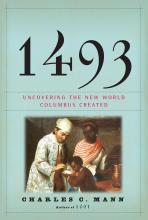February 2012 Featured Book
 1493: Discovering the New World Columbus Created
1493: Discovering the New World Columbus Created
by Charles Mann '76
"Mann has managed the difficult trick of telling a complicated story in engaging and clear prose while refusing to reduce its ambiguities to slogans." - Ian Morris, New York Times Sunday Book Review
- Learn more about the author (view alumni profile)
- Listen to the interview with Charles Mann '76 and professor Jan Dizard
- Read an excerpt
- Read a review
- View a gallery of images from Mann's travels
- Join the discussion
In 1493, Charles Mann gives us an eye-opening scientific interpretation of our past, unequaled in its authority and fascination. More than 200 million years ago, geological forces split apart the continents. Isolated from each other, the two halves of the world developed radically different suites of plants and animals. When Christopher Columbus set foot in the Americas, he ended that separation at a stroke . The Columbian Exchange, as researchers call it, is the reason there are tomatoes in Italy, oranges in Florida, chocolates in Switzerland, and chili peppers in Thailand. More important, creatures the colonists knew nothing about hitched along for the ride, changing lives and landscapes across the planet.
The Columbian Exchange underlies much of subsequent human history. Presenting the latest research by ecologists, anthropologists, archaeologists, and historians, Mann shows how the creation of this worldwide network of ecological and economic exchange fostered the rise of Europe, devastated imperial China, convulsed Africa, and for two centuries made Mexico City--where Asia, Europe, and the new frontier of the Americas dynamically interacted--the center of the world. In such encounters, he uncovers the germ of today's fiercest political disputes, from immigration to trade policy to culture wars.